Taxi accidents involving older taxi drivers rose from 8 percent to 27 percent of the total from 2013 to 2022. That raised a red flag about elderly taxi drivers, but Transport Department data show younger drivers score higher accident rates. Updated taxi safety proposals will be submitted for Legislative Council review early next year. Chai Hua reports from Hong Kong.

The number of elderly taxi drivers involved in traffic accidents almost tripled from 400 in 2013 to 1,100 in 2022. In the same period, the percentage of taxi accidents involving older taxi drivers rose from 8 to 27 percent. More than half of the city’s taxi driver’s-license holders are over 60 years old. Among them, the number of taxi drivers aged 70 years old or above rose 80 percent from 2018 to 2023, from 17,500 to over 31,000.
The taxi driver age group of 20-to-24-year-olds recorded the highest accident rate at 51.3 per 1,000 licensed drivers, while it was 15.8 per 1,000 for the over-70-year bracket, according to Transport Department statistics, showing that the assumption that taxi accidents are primarily due to “doddering old drivers” is false.
The concern about aging taxi drivers could distract policymakers from solving the complex issues over private-taxi transport. Chasing health testing and age caps, and ignoring radical alternatives, could make the problem worse.
Annual taxi insurance premiums rose to average HK$35,000 ($4,480) in 2022. Selina Lau, chief executive of the Hong Kong Federation of Insurers, says some insurers imposed an extra deductible to compensate for accidents involving drivers over 70 years old.
The Transport Department said that the Hong Kong Special Administration Region government has been committed all along to enhancing the service quality and operation environment of taxis, with a view to promoting the healthy and sustainable long-term development of the trade. The government has reviewed overall taxi operations and management, and proposed moving forward a series of initiatives to enhance the quality of personalized point-to-point transport services. In this regard, two bills were introduced to Legislative Council on July 12, and a Bills Committee has been created to scrutinize the bills.
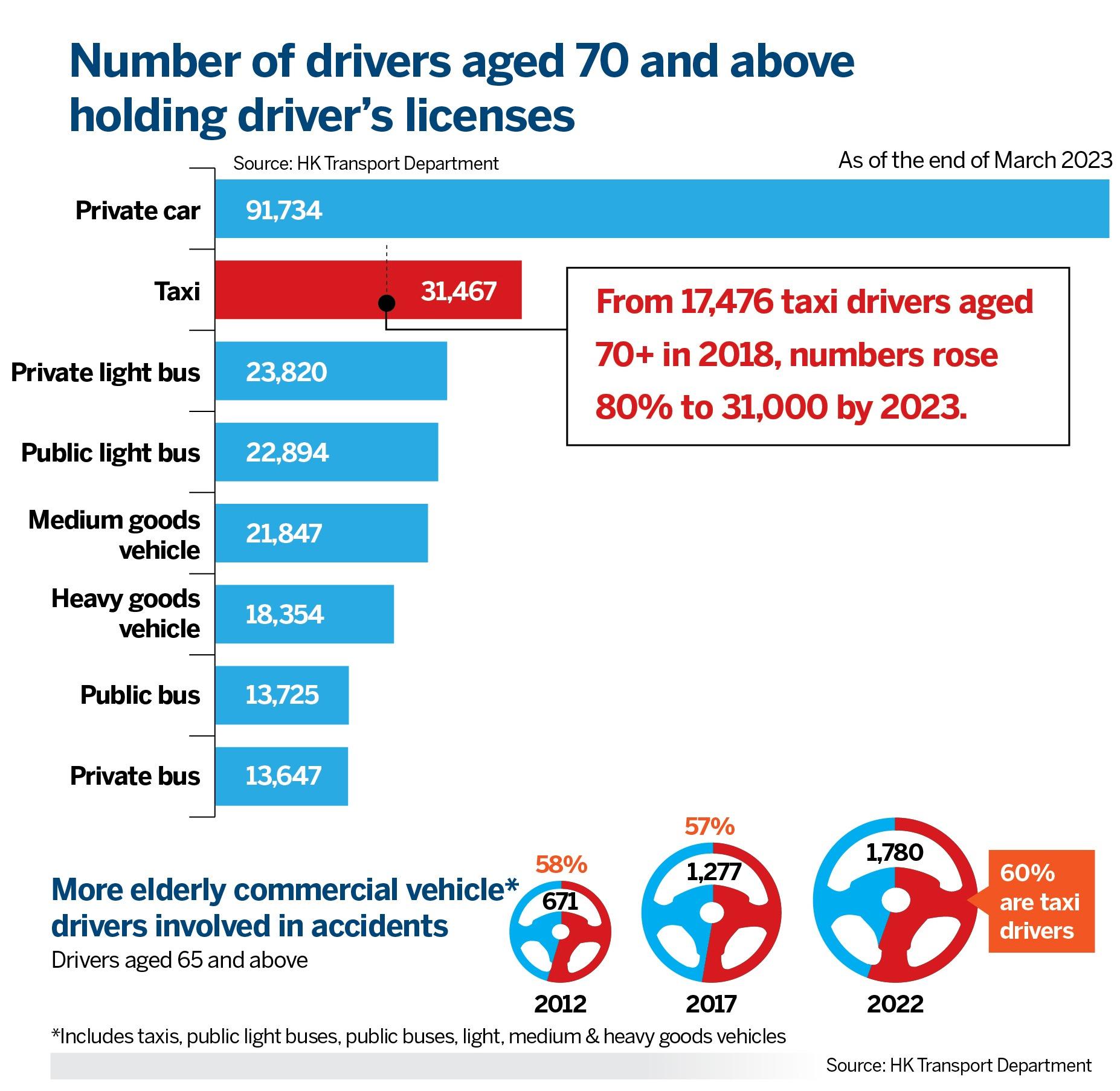
Drivers aren’t villains
Taxi drivers are not the villains, but victims of the cartels of taxi license owners — who are not drivers, asserts Sam Wong, founder and general secretary of the Taxi Drivers & Operators Association.
The Hong Kong Special Administrative Region government caps the number of taxi licenses at 18,000. New taxi licenses were stopped in 1994, three decades ago. This scarcity, despite a growing population and more tourists, inflates taxi license valuations into tradable assets like flats.
Traded speculatively within the circles of rich, privileged, cartel members, taxi license fees peaked at HK$7 million before settling at a still-hefty HK$3 million.
The fragmented industry structure of taxi license owners, taxi leasing companies, and taxi drivers creates a food chain of speculator-owners and rentiers, who carry no direct responsibility of care, for the aging drivers on 10-hour shifts, struggling to make a living.
Ringo Lee, chairman of the Institute of the Motor Industry Hong Kong, said he believes that around 90 percent of taxi drivers rent vehicles from leasing companies on a daily basis. Leasing companies manage vehicles only, while drivers are self-employed and have no social welfare. The leasing system is the crux of the complicated issue, Lee said.
“Under this system, the longer a taxi driver works, the more income. However, extended hours can lead to fatigue, especially for elderly drivers, increasing the likelihood of accidents. If a driver isn’t feeling well, he may still lease a vehicle and work, compounding the problem,” Lee said.
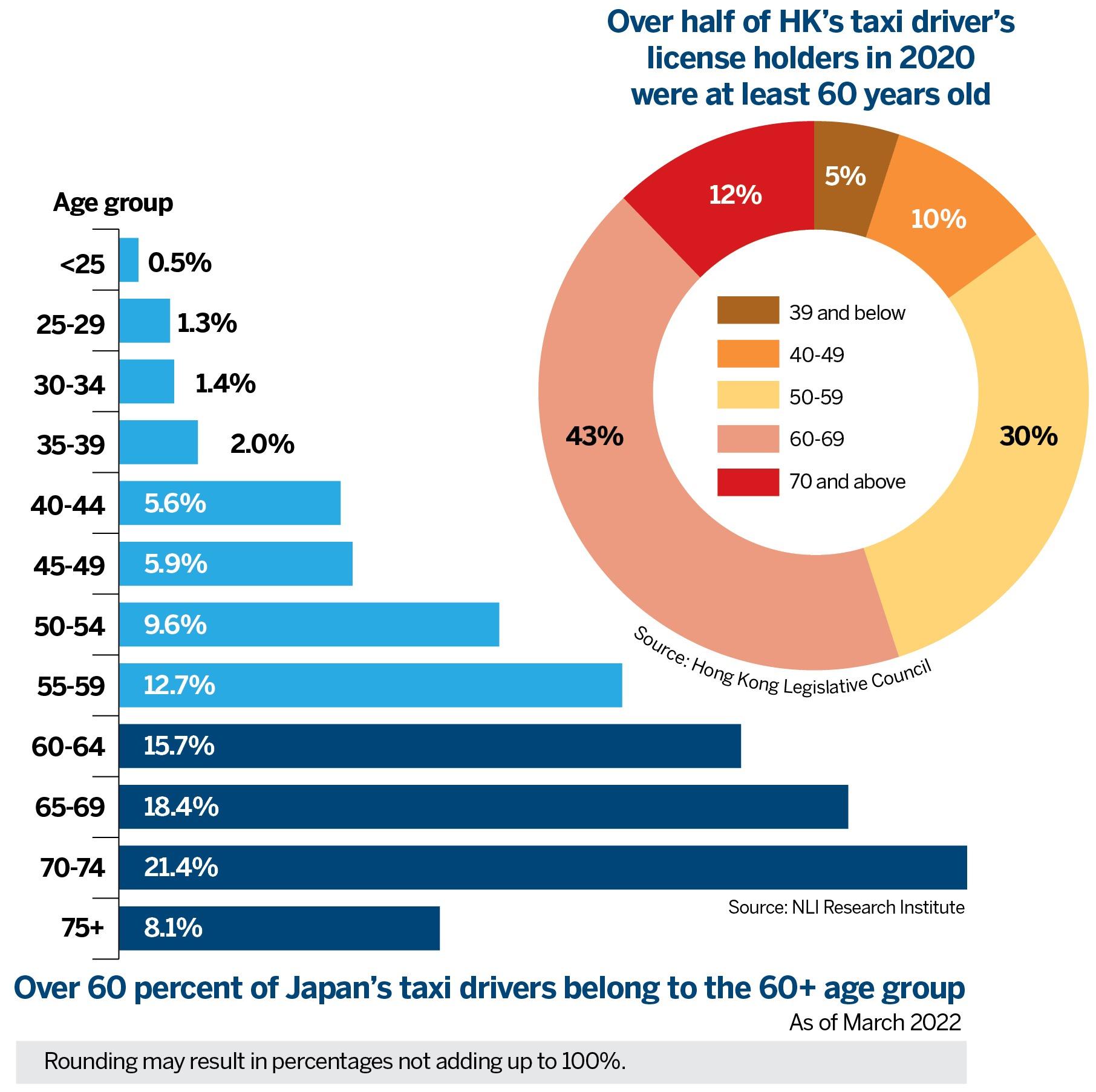
Fix root causes
Industry observers, scholars, and social workers call for wholesale review and reform to be led by the HKSAR government. Besides elderly health checks and automated alert systems in vehicles that the government is looking into, radically modernizing the entire ecosystem would be far more useful and benefit all, advocates said.
The suggestions come more than a half-decade after the city Consumer Council study of 2017 spelled out various problem-solving options adopted and implemented by governments elsewhere.
“We need comprehensive reform of our personalized point-to-point transport industry with all stakeholders having their say, for better regulation of the sector,” said Alex Liu, managing partner at Boase Cohen & Collins, Solicitors & Notaries, and a panel chairman of the Transport Tribunal.
The Transport Tribunal hears appeals against decisions made by the commissioner for transport on matters such as vehicle registration and licensing, driving licenses, and car-hire permits.

Ride hailing?
“A good starting point would be to understand that taxis are here to serve the consumer, hence the consumer’s best interests should be at the core of the new policy,” Liu said.
When asked if allowing car-hailing services would help address the issue, he said the problems surrounding Hong Kong’s taxi industry and ride-hailing services are complex and deep-rooted.
“Whether Uber-like service remains illegal or permitted, citizens have shown they are prepared to pay a premium for better cars and drivers, full digital facilitation from booking to credit card payment, to driver reviews, and greater convenience,” he said.
Unlike other major Asian cities like Singapore, Beijing, Kuala Lumpur and Jakarta, private car-hailing services remain illegal in Hong Kong. The taxi-license owners are quick to organize protests whenever ride-hailing permits are considered.
Liu said the Singapore government decided that Grab’s ride-hailing complemented traditional taxi services. Singapore-based Grab was legalized in 2017.
“The taxi lobby here is powerful with close connections to the authorities, ... whereas the taxi lobby in Singapore only asked for ride-hailing drivers to be subjected to the same regulations. The government’s objective was to protect commuter interests and safety, which should be the case in Hong Kong,” Liu said.
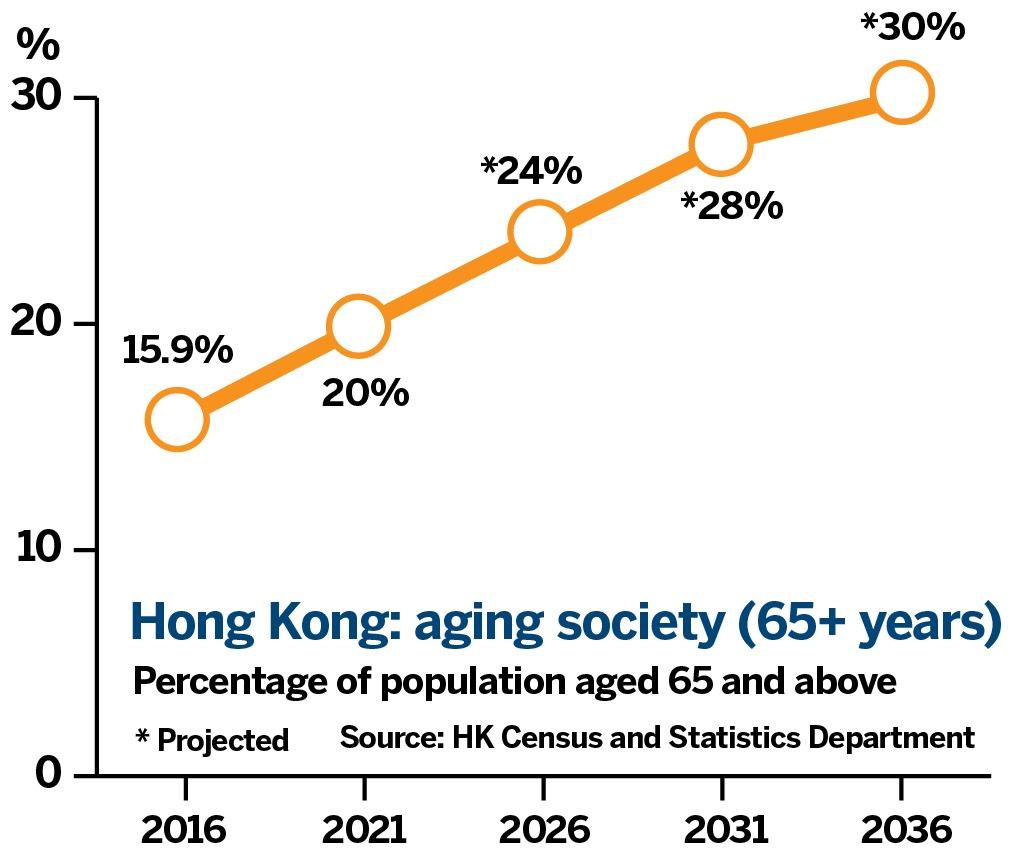
Stricter fitness requirements
Lam Sai-hung, secretary for transport and logistics, said, “The HKSAR government is concerned about the health conditions of drivers and has been closely monitoring the physical fitness requirements of drivers and related issues, as well as strengthening publicity efforts on road safety.”
The bureau has engaged a consultant team from the School of Public Health in Li Ka Shing Faculty of Medicine, University of Hong Kong, to consolidate the professional advice offered by the expert panel and the healthcare sector, conduct in-depth studies, and offer support to the conduct of the consultation and legislative amendment work.
The government has put forward six recommendations, including lowering the age threshold for submitting physical fitness certification from “the age of 70 or above” to “65 or above”, and changing the validity of full driving license from “one year or three years” to “one year” for those who have reached the age threshold.
It also suggests a more-comprehensive medical examination certificate, more-stringent physical fitness requirements for drivers of commercial vehicles, and the drafting of relevant medical guidelines.
The government plans to submit proposals to the Legislative Council in the first half of 2024, to be implemented in the second half, subject to passage of the amendments and completion of system upgrades. Lam also confirmed that medical examination subsidies for drivers will be considered.
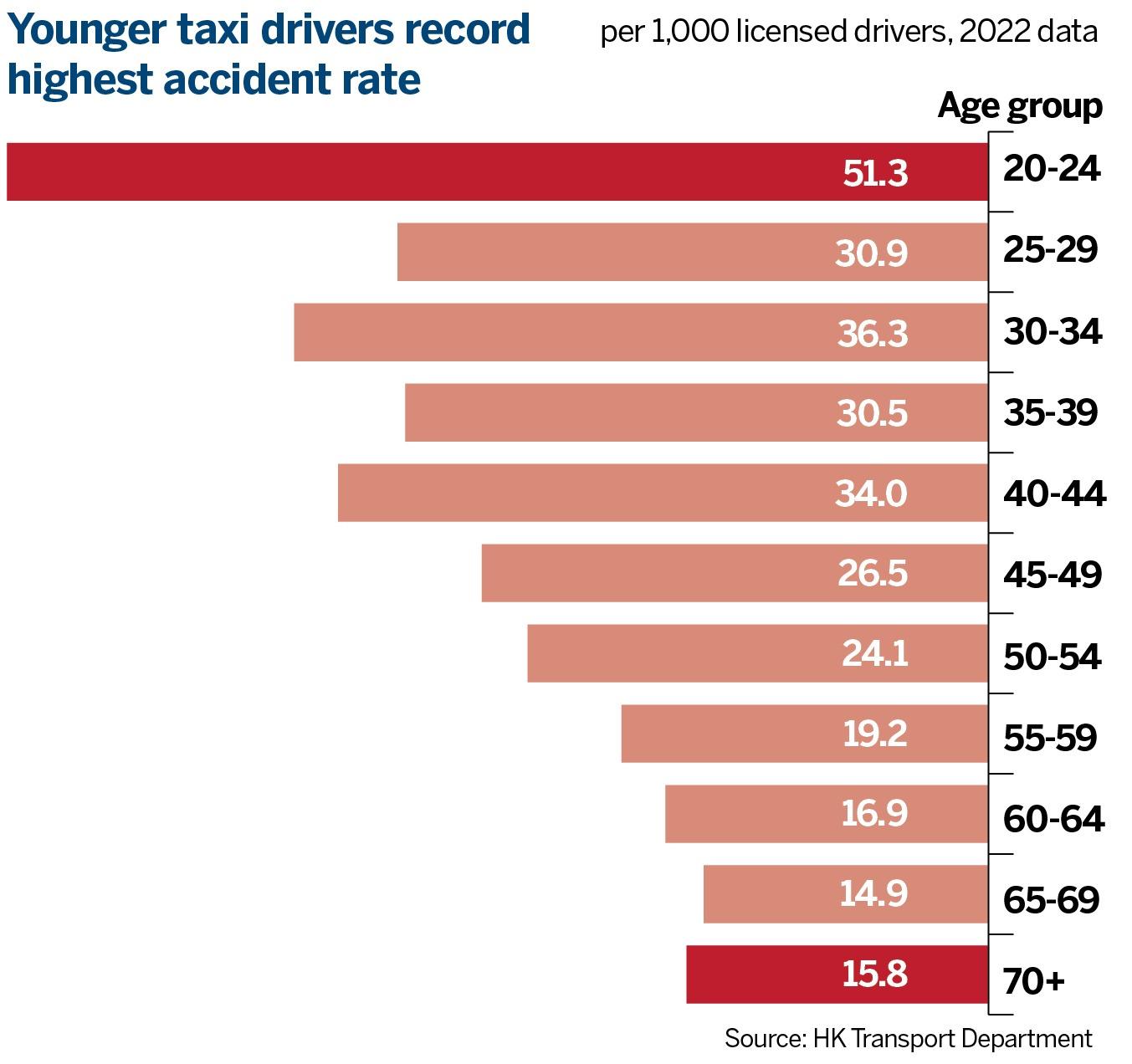
Fleet management
The government proposed a measure to introduce a taxi fleet regime, under which existing taxi owners may assemble taxis to form a fleet and apply to the Transport Department for a Taxi Fleet Licence. The key license conditions stipulate that online booking channels must be provided to allow e-booking, the lodging of inquiries, and complaints and rating of drivers’ performances.
An organization for driver fleet management was welcomed by Lee. “Modernization of the taxi industry needs a holistic approach. The government is searching for solutions, such as adopting Didi’s management rules,” he added, referring to mainland ride-hailing company Didi Chuxing Technology.
He suggested the relationship should become like employers and employees with stable incomes and social welfare, like with the Mandatory Provident Fund, which could attract younger drivers and improve service. Such fleet management can pave the way for importing professional drivers from outside the city. The taxi sector is excluded from the Labour Importation Scheme due to unresolved employment and interest conflicts with local drivers.
The Labour Importation Scheme, which addresses the city’s construction, aviation and transport sectors, has received more than 100 applications in the public light-bus and coach category, to import about 1,600 drivers.
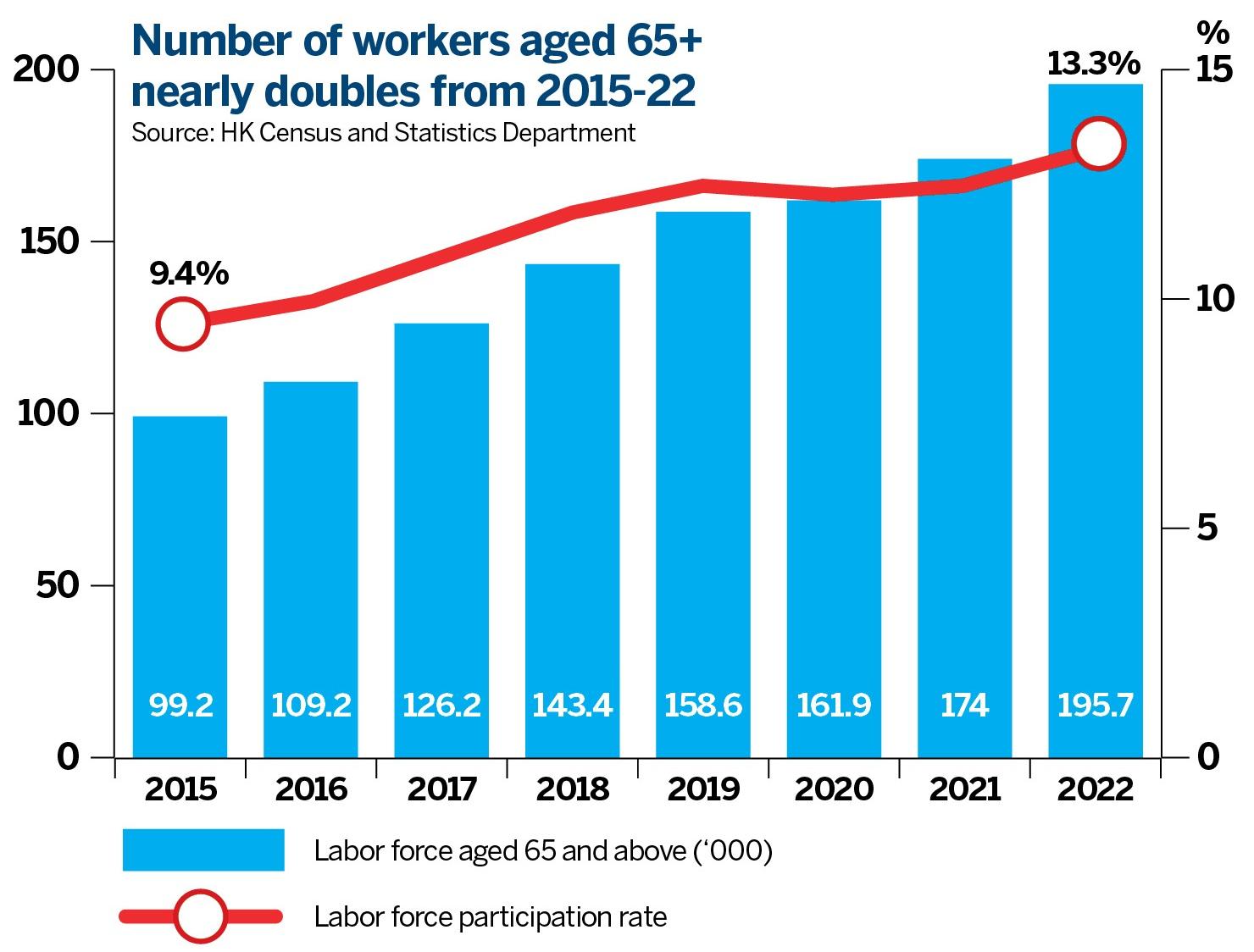
More targeted checks
Sam Wong of the Taxi Drivers & Operators Association said targeted health checks for taxi drivers are essential, but should assess not only general health but also specific aspects like vision, hearing, and reflexes to determine driving capabilities.
The association has launched a one-stop rapid health checkup service in Hong Kong which is capable of completing 37 physiological tests and generating reports in 15 minutes, all at the price of HK$350. Wong said 100 such AI-empowered facilities will open this year.
Lee said that cognitive function assessments, such as reaction speed, communication skills, and memory, should be considered as well. “The current examination is too simple, and the government should establish objective scientific criteria,” he added.
The health of elderly drivers is just one of the factors in traffic accidents. Hong Kong’s narrow roads and suboptimal vehicles are other contributory factors, according to Wong. Of the 18,000 taxis currently in Hong Kong, 3,000 are five-seat LPG (liquefied petroleum gas) taxis over 15 years old. Older taxis are preferred by drivers due to lower rental costs.
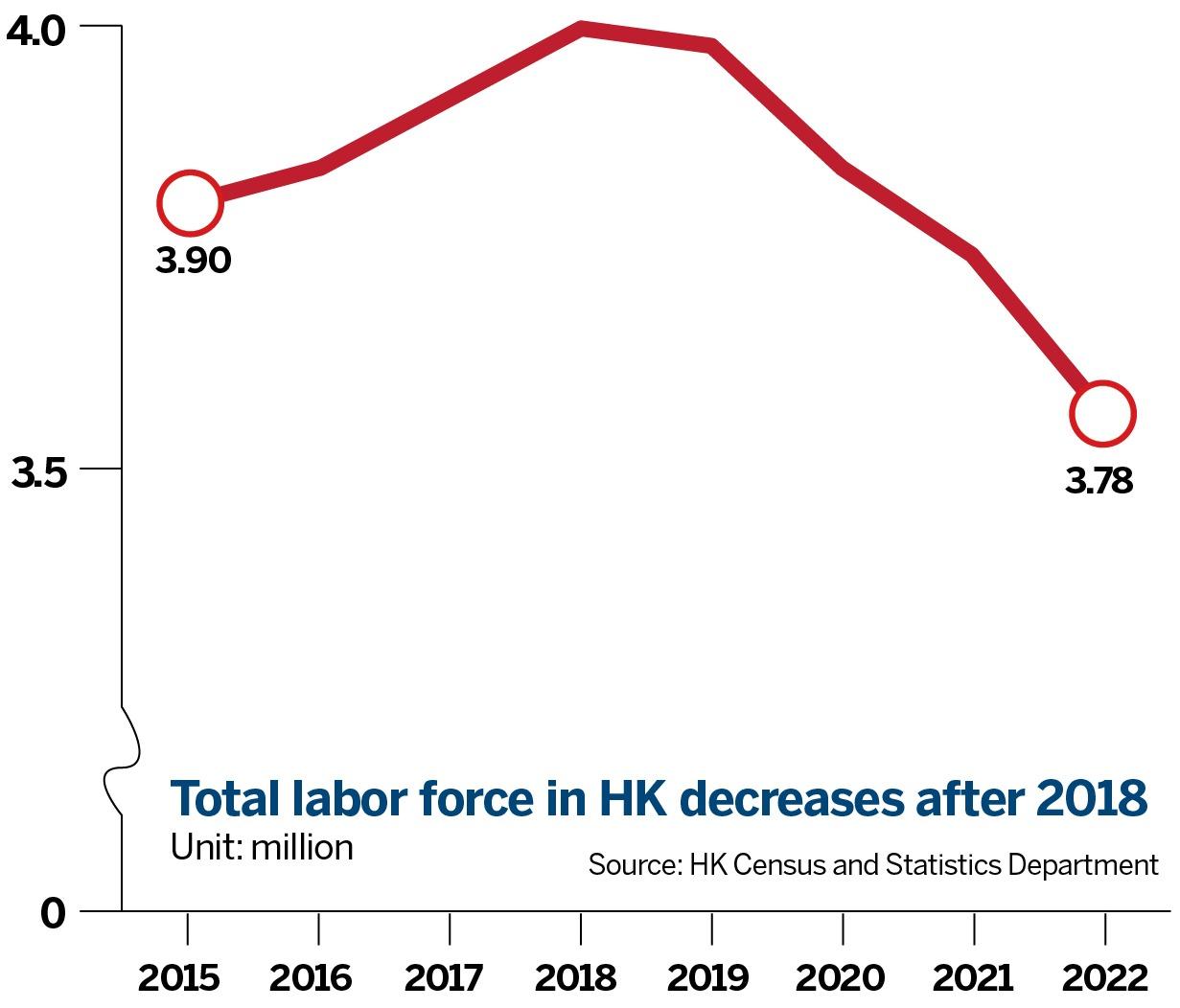
Sensors, electric vehicles
The government set up the Smart Traffic Fund to support research and vehicle-related innovation and technology. Lam Sai-hung said that to date, the fund has approved three projects relating to taxi driving safety, including the trial of safety monitoring systems for prompt alerts.
Lee confirmed that in Japan, where elderly taxi drivers are also quite common, taxis are installed with automated sensing devices that can trigger emergency braking or send warnings when the vehicle is in the wrong lane. Lee suggests incentives to encourage elderly drivers to return their taxi licenses.
The Taxi Drivers & Operators Association said that Hong Kong is set to introduce a fleet of 4,000 electric taxis by the end of 2023, to progressively replace the entire taxi fleet with electric vehicles.
These new electric taxis will be equipped with intelligent systems to monitor drivers’ health, such as dozing off — or a sudden heart attack. They would support mobile payments and in-vehicle systems to optimize service. Electric vehicles can save on the cost of LPG for fuel.
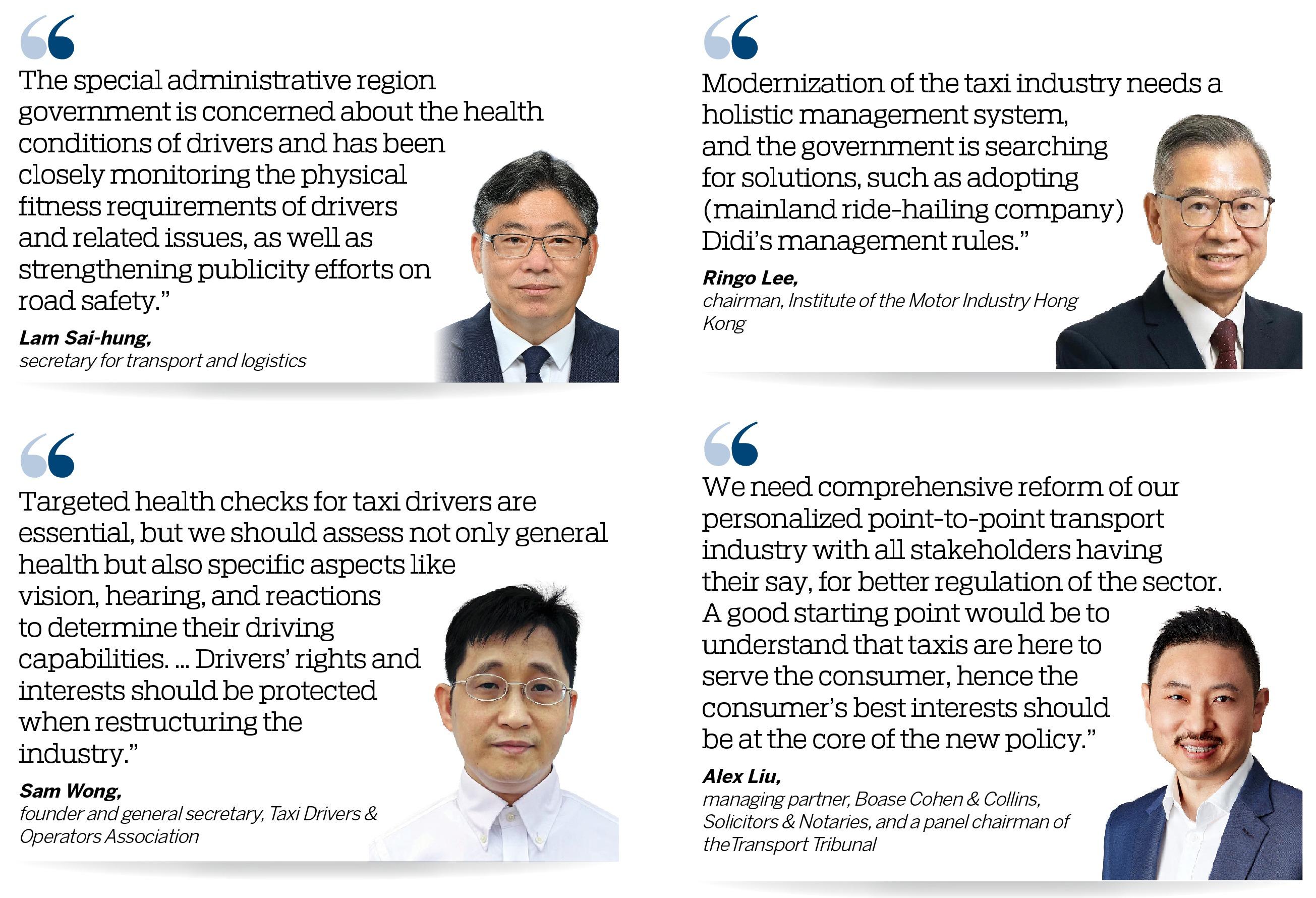
Care for drivers
Wong at the Taxi Drivers & Operators Association said that drivers’ rights and interests should be protected when restructuring the industry.
Lee Chun-hung, a 75-year-old taxi driver who works 10 hours a day on Hong Kong’s bustling streets, once dozed off at the wheel and crashed into a roadside barrier. The passenger was unharmed, but the vehicle was wrecked. He switched to the day shift after that, acknowledging his vision isn’t as sharp at night.
When asked why he still works so hard in his 70s despite health concerns, he said it is to support his daughter’s university education. “Worrying about my health doesn’t help,” he says. “I have to keep earning.”
Renting taxis on a daily basis of HK$400 plus HK$100 fuel costs, calculated Wong, may yield a net of HK$60 per hour over an arduous 10-hour shift of 25 rides. The mandatory low minimum wage is HK$40 per hour in Hong Kong.
The only social welfare available to the elderly is the Old Age Living Allowance under the Social Security Allowance Scheme. Hong Kong residents aged 65 or above can apply for monthly financial support of HK$4,060 if their total income per month is less than HK$10,580 for a single person and HK$16,080 for a married couple. Their total asset value cannot exceed HK$388,000 for a single person and HK$589,000 for a couple.
“The more you work, the more you earn,” said driver Lee, talking with China Daily, his right hand trembling all the while due to Parkinson’s disease. He also battles diabetes. Lee plans to continue driving for another year before quitting.
What's next
1. Lower the age threshold for physical fitness certification.
2. Enrich the content of the medical examination certificate.
3. Adopt a holistic review to modernize the taxi industry.
4. Support innovative technologies and devices to improve driving safety.
5. Improve drivers’ living and social welfare.
In Hong Kong, you'll notice a significant presence of senior workers in the workforce. Have you ever wondered why this is the case? In this video, we delve into the reasons behind the necessity of senior employees, as well as the opportunities and challenges. (Published on March 31, 2023)
Contact the writer at grace@chinadailyhk.com


